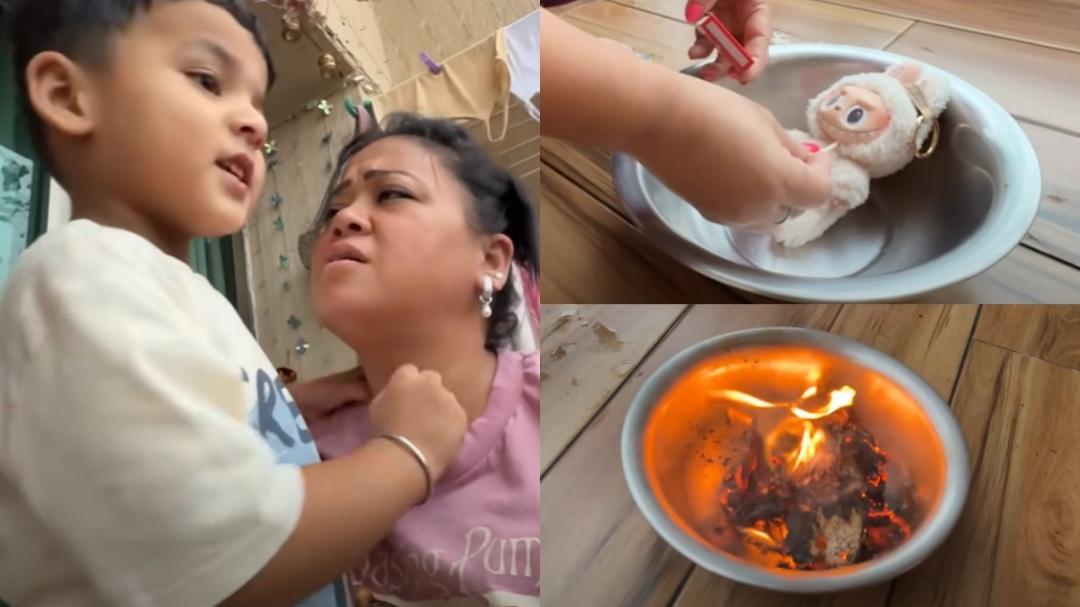
Bharti Burns Son’s Labubu Doll, Blames it for ‘Negative Energy’
Bharti Singh, the popular Indian comedian, has sparked controversy by burning her three-year-old son Lakshya’s Labubu doll, claiming it was bringing negative energy into their home. She shared a vlog on her social media handle, detailing the unusual changes she noticed in her son’s behavior after they brought the doll home.
In the vlog, Bharti mentioned that Lakshya started exhibiting strange behavior after they brought the Labubu doll home. He would scream uncontrollably, throw things around the house, and refuse to listen to her or her husband. Bharti was concerned about her son’s behavior and suspected that the doll was the source of the problem.
The comedian, known for her bold and outspoken personality, also mentioned that the doll itself looked “very creepy” to her. She believed that the doll’s eerie appearance was contributing to the negative energy in their home. Bharti’s decision to burn the doll has sparked a heated debate online, with many people questioning her actions and others siding with her.
The Labubu doll, which is a popular toy in India, is known for its unique design and quirky features. The doll is made of soft, plush material and has a distinctive appearance that sets it apart from other toys. However, Bharti’s experience with the doll suggests that it may not be as innocent as it appears.
Bharti’s decision to burn the doll was a drastic one, and it has raised questions about the potential negative effects of possessive parenting. While it is understandable that Bharti was concerned about her son’s behavior, burning the doll was an extreme measure that may have sent the wrong message to her child. Children often look to their parents for guidance and reassurance, and Bharti’s actions may have inadvertently reinforced the idea that certain objects or entities can be blamed for problems.
Moreover, Bharti’s decision to burn the doll may have also perpetuated the idea that certain objects or entities can be imbued with negative energy. This belief is rooted in ancient superstitions and is often associated with cultures that believe in the supernatural. While Bharti may have been trying to protect her son and her home, her actions may have also perpetuated harmful beliefs and superstitions.
In contrast, many experts argue that children’s behavior is often shaped by environmental factors, such as parenting styles, social interactions, and cognitive development. Children may exhibit unusual behavior for a variety of reasons, including frustration, boredom, or a need for attention. Rather than blaming objects or entities, parents should focus on understanding the underlying causes of their child’s behavior and addressing them in a constructive manner.
Bharti’s experience with the Labubu doll also raises questions about the role of toys in our lives. Toys are designed to provide entertainment, education, and comfort to children. However, some toys may have unintended consequences, such as creating a sense of dependence or reinforcing negative behaviors. Parents should be aware of the potential effects of toys on their children and choose toys that promote healthy development and positive behaviors.
In conclusion, Bharti’s decision to burn her son’s Labubu doll, blaming it for “negative energy,” has sparked a heated debate online. While it is understandable that Bharti was concerned about her son’s behavior, burning the doll was an extreme measure that may have sent the wrong message to her child. Parents should focus on understanding the underlying causes of their child’s behavior and addressing them in a constructive manner. By doing so, we can promote healthy development and positive behaviors in our children.
Source:






